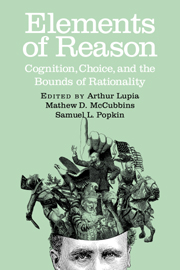Book contents
- Frontmatter
- Contents
- List of Tables and Figures
- Acknowledgments
- List of Contributors
- Beyond Rationality: Reason and the Study of Politics
- PART I EXTERNAL ELEMENTS OF REASON
- PART II INTERNAL ELEMENTS OF REASON
- 8 Reconsidering the Rational Public: Cognition, Heuristics, and Mass Opinion
- 9 Three Steps toward a Theory of Motivated Political Reasoning
- 10 Knowledge, Trust, and International Reasoning
- 11 Coping with Trade-Offs: Psychological Constraints and Political Implications
- 12 Backstage Cognition in Reason and Choice
- 13 Constructing a Theory of Reasoning: Choice, Constraints, and Context
- References
- Author Index
- Subject Index
11 - Coping with Trade-Offs: Psychological Constraints and Political Implications
Published online by Cambridge University Press: 05 June 2012
- Frontmatter
- Contents
- List of Tables and Figures
- Acknowledgments
- List of Contributors
- Beyond Rationality: Reason and the Study of Politics
- PART I EXTERNAL ELEMENTS OF REASON
- PART II INTERNAL ELEMENTS OF REASON
- 8 Reconsidering the Rational Public: Cognition, Heuristics, and Mass Opinion
- 9 Three Steps toward a Theory of Motivated Political Reasoning
- 10 Knowledge, Trust, and International Reasoning
- 11 Coping with Trade-Offs: Psychological Constraints and Political Implications
- 12 Backstage Cognition in Reason and Choice
- 13 Constructing a Theory of Reasoning: Choice, Constraints, and Context
- References
- Author Index
- Subject Index
Summary
A thoughtful reader of the psychological literature on judgment and choice might easily walk away with the impression that people are flat-out incapable of reasoning their way through value trade-offs (Kahneman, Slovic, and Tversky 1982). Trade-offs are just too cognitively complex, emotionally stressful, and socially awkward for people to manage them effectively, to avoid entanglement in Tverskian paradoxes, such as intransitivities within choice tasks and preference reversals across choice tasks. But what looks impossible from certain psychological points of view looks utterly unproblematic from a microeconomic perspective. Of course, people can engage in trade-off reasoning. They do it all the time – every time they stroll down the aisle of the supermarket or cast a vote or opt in or out of a marriage (Becker 1981). We expect competent, self-supporting citizens of free market societies to know that they can't always get what they want and to make appropriate adjustments. Trade-off reasoning should be so pervasive and so well rehearsed as to be virtually automatic for the vast majority of the non-institutionalized population.
We could just leave it there in a post-positivist spirit of live-and-let-live pluralism. The disciplinary divergence provides just another illustration of how competing theoretical discourses construct reality in their own image. This “resolution” is, however, less than helpful to political scientists who borrow from cognitive psychology or microeconomics in crafting theories of political reasoning. The theoretical choice reduces to a matter of taste, in effect, an unconditional surrender to solipsism.
- Type
- Chapter
- Information
- Elements of ReasonCognition, Choice, and the Bounds of Rationality, pp. 239 - 263Publisher: Cambridge University PressPrint publication year: 2000
- 58
- Cited by

